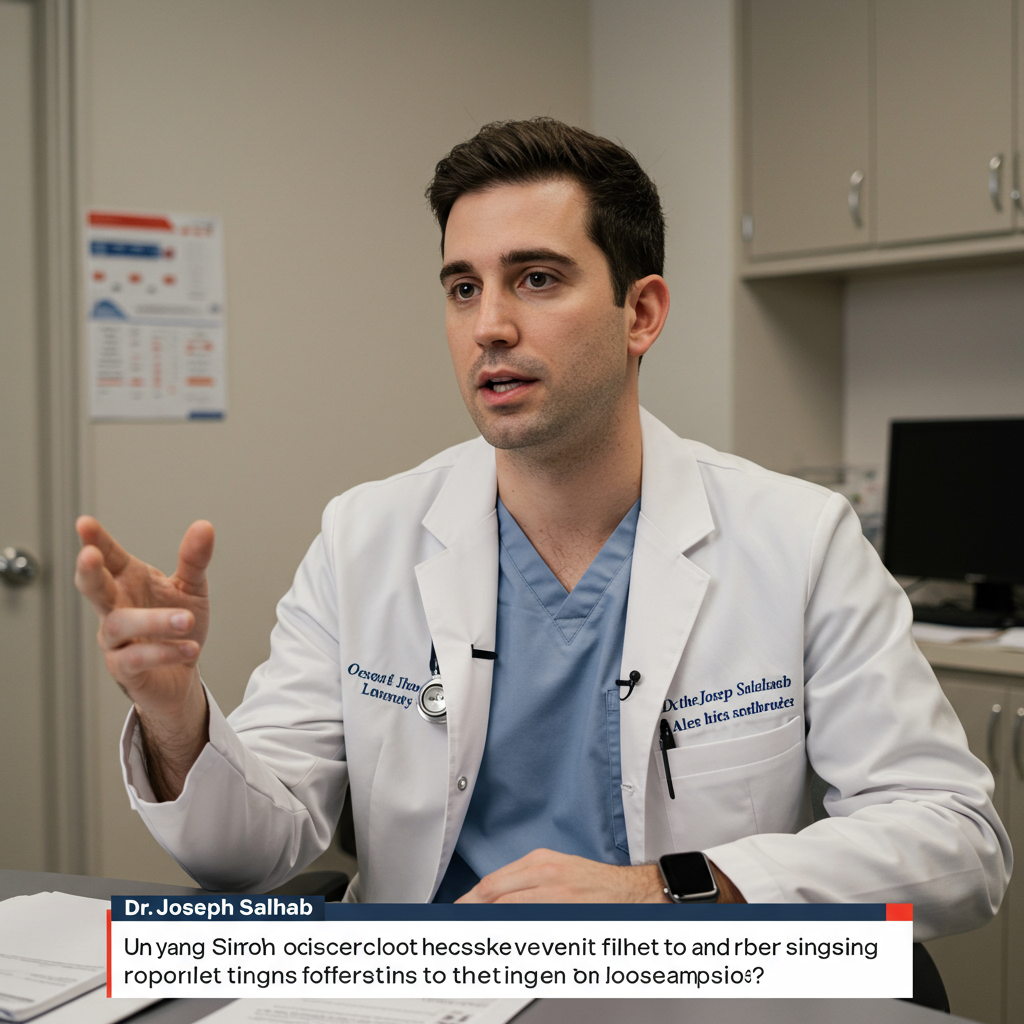Colon cancer, often referred to as colorectal cancer, is a serious health concern. While historically associated with older adults, disturbing trends show increasing cases in younger populations. A leading voice highlighting this issue is gastroenterologist Dr. Joseph Salhab, known online as @thestomachdoc.
Dr. Salhab recently took to Instagram, specifically on July 8th, to share critical insights. He urged young people to pay close attention to potential signs of colon cancer. His message was prompted by a poignant video depicting a young man undergoing colonoscopy prep, only to receive a diagnosis of stage 4 colon cancer at just 25 years old.
“I am seeing colon cancer in younger and younger people,” Dr. Salhab stated in his video. He shared symptoms that individuals who were later diagnosed often reported. These were the “top warning signs” that finally compelled them to seek medical evaluation.
Key Warning Signs of Colon Cancer Shared by a Gastroenterologist
Based on patient experiences shared with him, Dr. Salhab detailed several significant indicators. Recognizing these signs early is crucial, especially for younger individuals.
Persistent, Unexplained Abdominal Pain
Dr. Salhab highlighted unexplained abdominal pain that just keeps happening no matter what as a major warning sign. This isn’t fleeting discomfort. It’s pain that persists without a clear cause and doesn’t resolve easily.
Significant Changes in Bowel Habits
Another critical symptom is a change in bowel habits. This involves becoming either more constipated or experiencing diarrhea more frequently than usual. Crucially, this change is persistent, lasting longer than a few weeks. Any new, ongoing shift in your normal routine warrants attention.
Unexplained Poor Appetite
A noticeable poor appetite without a clear reason was also mentioned by Dr. Salhab. Losing interest in food or feeling full quickly can be a subtle but important signal the body is sending.
Drenching Night Sweats
Night sweats where you feel drenched at night are another sign to be aware of. While night sweats can have many causes, when combined with other potential symptoms, they could indicate an underlying health issue like colon cancer.
Lingering Low-Grade Fevers
Finally, Dr. Salhab listed low grade fevers that just keep happening. Fevers are the body’s response to infection or illness. Persistent low-grade fevers, however, especially when unexplained, should be investigated.
Understanding Colon and Rectal Cancer Symptoms
Colon cancer begins as abnormal growths called polyps in the large intestine (colon) or rectum. Not all polyps become cancerous, but some can over time. Early detection through screening is vital, though awareness of symptoms is equally important, particularly as cases rise in younger age groups.
In addition to the signs highlighted by Dr. Salhab, other common symptoms of colon cancer include:
Blood in the stool
General pain in the abdomen
Anemia (often due to chronic blood loss)
Feeling unusually tired or fatigue
Abdominal discomfort (gas, bloating, fullness)
Unintended weight loss
It’s important to note that experiencing one or more of these symptoms does not automatically mean you have colon cancer. Many other less serious conditions can cause similar issues. However, ignoring persistent symptoms can delay diagnosis.
The Alarming Trend Among Young Adults
The increase in colon cancer diagnoses among younger adults is a growing concern for medical professionals. Dr. Salhab’s observations align with broader trends. As noted in a July 16, 2024, interview, consultant radiation and clinical oncologist Dr. Neeraj Dhingra also pointed to this disturbing rise in young adults. While the specific reasons for this trend weren’t detailed in the provided information, the reality of increasing young adult cases underscores the importance of vigilance and symptom awareness for this demographic.
Historically, colon cancer screening guidelines focused on older adults. However, the changing landscape of diagnoses is prompting discussions about potential updates and increased awareness for younger individuals. Being proactive about your health and understanding the signs is a critical first step.
When to Seek Medical Advice
If you experience any of the warning signs mentioned by Dr. Salhab or the other common symptoms of colon cancer, particularly if they are new, severe, or persistent (lasting more than a few weeks), do not delay seeking professional medical help. Discussing your symptoms openly and honestly with your doctor is the best way to determine their cause.
Your doctor can evaluate your specific situation, consider your medical history, and recommend appropriate tests if necessary. Early detection significantly improves outcomes for colon cancer treatment. Do not assume symptoms are merely due to minor issues, especially if they are ongoing. Taking action based on unusual or persistent bodily changes is a sign of responsible health management.
Frequently Asked Questions
What specific colon cancer warning signs did the gastroenterologist highlight?
Gastroenterologist Dr. Joseph Salhab pointed to five key warning signs that led some patients to get checked for colon cancer. These included unexplained and persistent abdominal pain, a change in bowel habits lasting several weeks (like new constipation or diarrhea), poor appetite without a clear cause, drenching night sweats, and recurring low-grade fevers. He emphasized that he is seeing these signs in younger people.
Why are experts emphasizing colon cancer signs for younger people now?
Experts like Dr. Salhab are seeing a concerning rise in colon cancer cases among younger adults, a demographic previously considered lower risk. Dr. Salhab’s recent message was prompted by a case where a 25-year-old was diagnosed with stage 4 colon cancer. This trend highlights the need for increased awareness and vigilance regarding potential symptoms in individuals below typical screening ages.
When should someone see a doctor about potential colon cancer symptoms?
You should consult a doctor if you experience any of the potential colon cancer warning signs or symptoms, especially if they are persistent or unusual for you. This includes unexplained abdominal pain, changes in bowel habits lasting more than a few weeks, poor appetite, persistent fatigue, unintended weight loss, or blood in the stool. Seeking prompt medical advice is crucial for proper diagnosis and care.
Take Action Based on Symptoms
The rise of colon cancer in younger adults is a stark reminder that this disease does not only affect older populations. Paying attention to your body and recognizing potential warning signs is the first line of defense. Dr. Salhab’s insights provide a valuable list of symptoms that should prompt further investigation.
If you are experiencing any of the symptoms discussed – particularly persistent abdominal pain, unexplained changes in bowel habits, poor appetite, night sweats, or low-grade fevers – please consult a healthcare professional without delay. Early detection offers the best chance for successful treatment. Your health is worth prioritizing.
Disclaimer: This article is for informational purposes only and does not constitute medical advice. Always consult with a qualified healthcare professional for any health concerns or before making any decisions related to your health or treatment.




